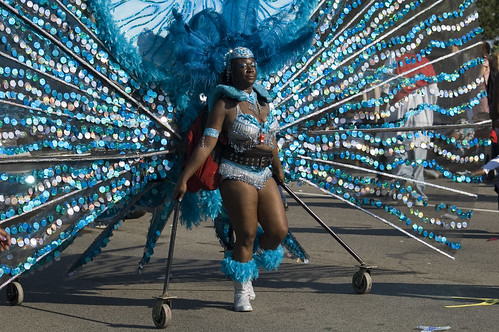Children's Carnival
This includes our future band leaders and parade organizers in action!
The generation of librarians coming up is definitely engaged in our profession. This week's fine example is Joy Weese Moll who took time away from studying her Cluetrain to write a very clever rant in Discover Your Strengths at Wanderings of a Student Librarian. She is perturbed by a book/web site called Now, Discover Your Strengths by Marcus Buckingham & Donald O. Clifton in which part of the self-help is meant to be accomplished by using a website that can only be accessed once using a passcode. Since she is working with a library copy of the book, you can imagine the result when Joy tries to access the website. Nonetheless, she perseveres by assessing what the results of the website might give her:
My Connectedness strength leads me to believe that a secondary motivator for such a book should be to change the world. You don't do that by hiding your light under a bushel or behind a firewall. The message in this book really could change our organizations. It delivers a convincing argument that the path to excellence is in developing our strengths while the path to mediocrity lies in attempting to remediate our weaknesses. But I can't recommend it to my organization--we would have to buy 150 copies to get started.
Both of these concerns, helping people and changing the world, should at least appear to take precedence over milking every last dollar out of the consuming public. The appearance of greediness takes something away from the overall message of the book--it makes me doubt its sincerity
The Industrial Librarian Dave Hook tells us that the growing neophyte organization Librarians Without Borders is now looking for applications for its Board of Directors. If you agree with their ideals, and perhaps have some knowledge or skills from which this young group can learn, you might want to consider applying:
We are looking for individuals who share LWB’s values and can offer their passion or expertise to the benefit of the organization, in areas such as financial management, non-profit governance, strategic planning, policy development, fundraising, international development, world libraries, communications, and human resources / volunteer management. We seek to nominate candidates so that the Board balances these interests (regardless of experience). But, of course, enthusiasm and dedication are the main qualifications required for these positions!
Arts & Cultural Festival
How do we work with the skills and tools we have? What culture has resulted from our work?
In Google's Phish Net (Aug. 10th) Kelli Staley updates us on the newest features of the Google Toolbar, both IE and Firefox versions. This from the 'Brary Web Diva is particularly interesting:
The new "safe browsing" feature is cool too! A warning pops up if you visit a suspected phishing site! yes, this was an extension, but now it's built in for everybody! I think they should have called it PhishNet.
Scott Vine, the Information Overlord from the U.K., provides us with a topical and useful list of RSS feeds from the U.K. government.
In the group blog Out of the Jungle, one of my favourite bloggers, Betsy McKenzie, continued her on-going discussion about the nature of the colour pink and working in a female dominated profession (librarianship) working alongside male dominated professions (academic and law) in Pink Conversation: Can Men be Pink? Betsy writes:
Librarianship is where I really found that supportive network of women who really want others to succeed. Who understand that the success of others only enhances their own success, never diminishes it.
And I have to say that I have male colleagues in the library and academic communities who have that same excellent attitude to collaboration. I am so pleased to have good friends, no matter what genderly persuasion, who have that terrific supportive nature.
So, if I define PINK as the aspect of helpful supportiveness, a collaborative attitude, yeah, I guess guys can be pink too. After all, if even cowgirls can get the blues, it's only fair that cowboys can be pink sometimes, too.
Steel Bands

Caribbean Soul - Pix from Caribana, originally uploaded by neuroticjose. Some rights reserved under Creative Commons.
Great things happen when people work together on ideas and projects! Like the steel bands, these bloggers are making beautiful music together:
Over at Science Library Pad, in response to Lorcan Dempsey's post Discovery and disclosure about making your content visible in as many venues as possible, Richard Akerman discusses the user experience in an online world in online library role in discovering and delivering. This is actually part of a larger exchange of posts between Lorcan and Richard, so it is worth the time to follow back and forth between their posts. From Richard's latest essay:It doesn't suffice simply to know that a book is in the library, what I want to know is when the book (or its contents) can come to me. That means online availability includes delivery options as a crucial element.
Can I get it immediately on my desktop as an e-book and/or audiobook? Can I have it on all my mobile devices? Can I get the book from the library in the mail? Can I get it couriered to me today? Can it be delivered with my newspaper tomorrow morning? Can I get it from Amazon? Can I get it used from Abebooks or Alibris? Does someone who lives near me have a copy? Is it on Project Gutenberg? Available as a book-on-demand printed copy? Can someone come read it to me? Can someone read it to me over the telephone? Is there a book club that is covering it? Can someone explain it to me? ...
You can see that in the online world, you're no longer in the warehousing business. You're in the logistics and collaborative partnership business. You have to decide
where your library should fit, are you a single one of the above options, or are you
an enabler for all of them?There is no logic, to me, in the library trying to run this supply chain. I think libraries need to outsource and insource - connect out to partners as well as let them connect in to you.
What's your delivery strategy?
Have you considered
partnering with:
- your postal service
- local and national couriers, e.g. FedEx and UPS
- other local delivery services, like your local newspapers
- volunteer organizations
- ebook and audiobook providers
- mobile device providers
- Google,
- Amazon, AbeBooks, Alibris, WorldCat, LibraryThing, Project Gutenberg,
...
Coincidentally, Michael Casey presents one such idea in Helene's Netflix/Amazon Mashup posted at LibraryCrunch. Library Crunch focuses on "service for the next generation library" and this post certainly typifies that goal. It discusses an idea by Helene Blowers, Public Services Technology Director for the Public Library of Charlotte & Mecklenburg County (PLCMC) in Charlotte, North Carolina which would allow for inexpensive delivery of materials:
Helene's idea was to utilize Amazon's library processing service in order to have pre-processed books sent directly to the library customer's home, where that person would, after reading the book, bring it to the library and, by returning it, enter it into the library's circulating collection. The book will already have its requisite spine label, bar code and mylar cover, so no additional processing will be required. Even the MARC record will already have been sent from Amazon, so the material will already by in your catalog.
Helene encouraged Michael to write about this, but as Michael pointed out, Helene's blog Library TechBytes will also be one to watch. Helene Blower really rocks this week! You should also have a look at the blog Learning 2.0 which contains the contents of PLCMC's Learning 2.0 program including text, graphics, and podcast. A brilliant use of the technology to explain the technology and some of the results that can be achieved with it. Thanks to Joy Weese Moll for telling me about this one.
King & Queen of the Bands

Caribbean Soul - Pix from Caribana, originally uploaded by neuroticjose. Some rights reserved under Creative Commons.
My favourite submission this week is from ricklibrarian Rick Roche. In Hangouts Feed Souls of Lonely by Kayce T. Ataiyero (A Chicago Tribune Article with Implications for Public Libraries), Rick describes an article he read about a restaurant frequented by seniors that dishes out much-needed hugs with its meals. He extrapolates that with so many seniors frequenting libraries, many may also be in need of similar attention. So much today we worry about how libraries are going to serve the younger generations, Y, Nexgen, N, etc., but often we forget about that other growing population, seniors. And turning the tables, Rick points out:
I am not really the kind of person to hang out at restaurants or taverns, so when I am older and perhaps lonely, I hope there is a public library for me. I might need more than books.
Rachel presents a technically enlightening discussion in What's Up with Mesh Tags posted at Women's Health News. She explains the use of "MeSH" or Medical Subject Headings in her blog. Click on the MeSH tags (a.k.a. controlled vocabulary for the librarians in the crowd) and it takes you into search results in PubMed. Very clever! Her procedure of selecting and adding the tags and then tieing them into PubMed requires a bit of work, but she explains that using MeSH on her blog helps her learn and keep up with the subject headings for her work. She also explains "it goes fairly quickly once you are used it and start to have many of the terms memorized." Great job, Rachel! Something for all of us to consider in our respective industries, especially when blogging for our clients.

Caribbean Soul - Pix from Caribana, originally uploaded by neuroticjose. Some rights reserved under Creative Commons.
The Parade

Colours, originally uploaded by Evoke. Some rights reserved under Creative Commons.
Last week in his podcast Check This Out! Jim Milles continues his series on Law Librarians at Work. He spoke with these librarians during the recent American Association of Law Libraries conference held in St. Louis: Diane Murley, Eileen Searls, Jim Kelly, June Liebert, Marian Parker, Nancy Babb, Tom Boone, and Steve Anderson. Jim is one of the most collegial librarians I know; he has encouraged many librarians in their professional efforts, myself included. If you haven't listened to his podcast before, I definitely encourage you to give it a try.
Michael Lines, Law Librarian and Information Coordinator /Bibliothécaire et coordonnateur de l'information for the Canadian Forum on Civil Justice/Forum canadien sur la justice civile in Edmonton headed us up over at Canadian co-operative legal research blog Slaw in a week-long look at Grey Literature (GL) in Canadian law. GL is better known in other areas such as medical librarianship, but it was a new concept to us in law; it is not surprising, then, that for a number of the discussions surround defining GL. Others not familiar with this concept will definitely find it of interest. In addition to posts by regular contributors who are law librarians, law professors, research lawyers, and knowledge managers, Michael facilitated posts by these fabulous guest bloggers to explain a thing or two:
Professor Kathryn Arbuckle, Law Librarian at the John A. Weir Memorial Law Library, University of Alberta;
Susan Salo, head of CISTI’s London NIC (NRC Information Centre);
Jim Suderman, member of the Canadian research team in the UBC-based InterPARES 2 research project directed by Dr. Luciana Duranti;
Hannelore Dekeyser, a legal researcher at the Interdisciplinary Centre for Law & ICT (K.U.Leuven, Belgium);
John Willinsky, Professor at the Department of Language and Literacy Education at the University of British Columbia and the Public Knowledge Project.
Floats

Caribbean Soul - Pix from Caribana, originally uploaded by neuroticjose. Some rights reserved under Creative Commons.
Floating a controversial idea, Tom Boone presents Library Laws... Are Meant to Be Broken. Tom argues that law libraries should no longer need specialized Electronic Services Librarians on staff; skills traditionally held by those in this position out now to be core competencies for all law libraries. Tom says:
In this day and age, all reference librarians should be well-versed in CALR [Computer Assisted Legal Research]. Most legal research is now performed using electronic resources, thus every reference librarian at a law school must know the ins and outs of these systems just to do the bare minimum required by their job descriptions. Those who aren't are courting obsolescence. So the idea that only one librarian in an institution should master these tools is outdated. This is now every reference librarian's job.Being in a smaller law firm library, we have certainly functioned in this manner. As manager, most of the collection development is part of my responsibility so "collecting" new services certainly is included so I do the licensing as a result. Larger organizations might have someone else doing this, but it does not necessarily have to be a whole separate role.
The Crowds

Caribbean Soul - Pix from Caribana, originally uploaded by neuroticjose. Some rights reserved under Creative Commons.
Walt Crawford has again surveyed and analyzed the metrics of library-related blogs in his newsletter Cites & Insights. Looking at Liblogs: The Great Middle [pdf, 30 pages], also available as a link from his blog Walt at Random, looks at over 200 blogs culled from over 500 blogs he identified. He looked at blog posts between March and May 2006 and compiled data including blog start date, frequency of posts, number of comments, comments per post, total length of post, average length of post, and size of blogroll, software used, typeface, text alignment and colours for readability, and use of a Creative Commons license. He gives a general write-up of the results, then gives a brief summary for each blog included in the survey. One encouraging note:
I’ve heard enough anecdotal evidence to suggest that blog readership has grown quite a bit. That may reflect ease of use via aggregators (with people subscribing who’ve never heard of “RSS”); it may also reflect the quality of library-related blogsThanks again to Joy Weese Moll who brought Walt's work to my attention! I see a lot of familiar names in the list, so everyone will want to check it out. Incidentally, because this survey was a lot of work (Walt gave up a good part of his summer for it) please do drop him a line and let him know how useful you find it. He'd appreciate the love.
The Party's Just Starting
Thank you for joining me this week! Next up we have The 'Brary Web Diva Kelli Staley who has the honour of hosting our golden episode, Carnival of the Infosciences #50! And if I missed your earth shattering post this week, don't forget you do have to submit it to increase your chances of a mention. You have the choice of sending your submission directly to the host or filling out the form over at the infosciences wiki. Kudos go to Greg Schwartz who keeps the Carnival running. Thanks, Greg!!
Cheers,
Connie

CARIBANA 2006, originally uploaded by Osei (Ozzy). Some rights reserved under Creative Commons.

3 comments:
Wow, what a wonderful carnival! And thanks for the great pointers, too! :)
What fun! I love the pictures and the themes. A delightful Carnival, Connie.
I agree. This is a really great carnival. I am going to have to come back and spend some time later today.
Post a Comment